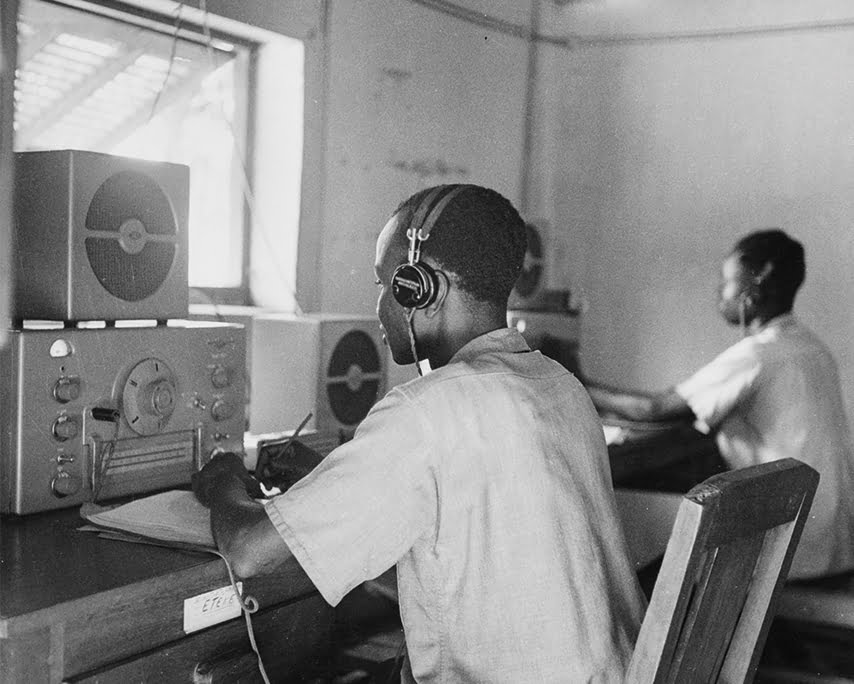A Gabonese radio operator sitting at communications equipment in a radio station in Lambarene, Gabon, circa 1955.
Photo credit: Realit/Three Lions/Hulton Archive/Getty Images
World Radio Day
On February 13th, the world celebrates World Radio Day, commemorating a century of radio’s profound impact on society. This year’s theme, “Radio: A century informing, entertaining, and educating,” pays homage to the pivotal role radio has played in shaping global communication.
A Legacy of influence
Since its inception, radio has been a cornerstone of information
dissemination, entertainment, and education. Dating back to the early 20th century, radio swiftly became the primary medium for delivering news updates, captivating dramas, soulful music, and electrifying sports commentary to millions of listeners worldwide.
In the realm of news, radio revolutionised the way people received current affairs updates. During critical historical moments such as World War II, radio broadcasts delivered breaking news updates, serving as a lifeline of information for citizens around the globe.
Radio also became the pulse of musical expression, introducing listeners to diverse genres and artists. From jazz to rock ‘n’ roll, radio stations became cultural hubs, showcasing the vibrancy of global music scenes.
Furthermore, sports enthusiasts found themselves glued to their radios, hanging onto every word of broadcasters as they narrated thrilling matches and historic sporting events, turning ordinary moments into unforgettable memories.
Radio’s resilience in Africa
United Nation’s News in an interview with Mario Maniewicz, Director of Radiocommunication at the International Telecommunication Union (ITU), it was emphasised that radio broadcasting maintains its unparalleled dominance over other mass media channels in Africa. Maniewicz highlighted radio’s significant role as a powerful medium for celebrating humanity’s diversity and facilitating democratic discourse. Moreover, he pointed out that at a global scale, radio remains the most extensively consumed medium, underscoring its unique capability to reach the widest audience and shape societal experiences of diversity while providing a platform for all voices to be heard and represented.
Despite the rise of the Internet and digital media platforms, radio remains an indispensable tool of communication in Africa. Its enduring relevance can be attributed to several factors, including accessibility, affordability, and cultural significance.
In many regions across Africa, Internet penetration remains limited, making radio the most accessible and reliable source of information for millions of people. Additionally, the affordability of radio receivers ensures that even those in remote areas can stay connected to the world around them.
Moreover, radio’s ability to transcend linguistic and cultural barriers makes it a unifying force in diverse African societies. With programming tailored to local tastes and interests, radio stations foster a sense of community and belonging.
Harnessing radio for social impact
As the world strives to achieve the Sustainable Development Goals (SDGs), radio emerges as a powerful ally in promoting positive social change. Organisations can leverage radio’s wide reach and influence to broadcast messages on pertinent SDGs.
Utilising radio as a platform for communicating Sustainable Development Goals (SDGs) involves crafting engaging content tailored to local contexts, broadcasting informative programmes, and collaborating with radio stations to ensure widespread dissemination. This approach includes producing educational segments, talk shows, and public service announcements that highlight the importance of each SDG, address relevant challenges, and offer practical solutions. By leveraging the wide reach and accessibility of radio, coupled with strategic partnerships and community engagement, organisations can effectively raise awareness, inspire action, and mobilise collective efforts towards achieving the SDGs on a global scale.
Furthermore, radio’s interactive nature allows for direct engagement with listeners, enabling feedback, and dialogue on important issues. By involving local communities in the conversation, radio programmes can foster ownership and mobilise collective efforts towards achieving SDGs at the grassroots level.
As we celebrate World Radio Day, let us recognise the enduring legacy of radio in informing, entertaining, and educating generations. In an ever-changing media landscape, radio continues to shine as a beacon of communication, connecting people, and catalysing positive change around the world.



